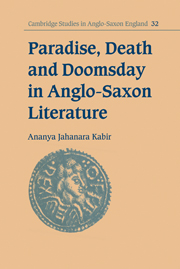Book contents
- Frontmatter
- Contents
- Preface
- List of abbreviations
- 1 Between Eden and Jerusalem, death and Doomsday: locating the interim paradise
- 2 Assertions and denials: paradise and the interim, from the Visio Sancti Pauli to Ælfric
- 3 Old hierarchies in new guise: vernacular reinterpretations of the interim paradise
- 4 Description and compromise: Bede, Boniface and the interim paradise
- 5 Private hopes, public claims? Paradisus and sinus Abrahae in prayer and liturgy
- 6 Doctrinal work, descriptive play: the interim paradise and Old English poetry
- 7 From a heavenly to an earthly interim paradise: toward a tripartite otherworld
- Select bibliography
- Index
3 - Old hierarchies in new guise: vernacular reinterpretations of the interim paradise
Published online by Cambridge University Press: 19 October 2009
- Frontmatter
- Contents
- Preface
- List of abbreviations
- 1 Between Eden and Jerusalem, death and Doomsday: locating the interim paradise
- 2 Assertions and denials: paradise and the interim, from the Visio Sancti Pauli to Ælfric
- 3 Old hierarchies in new guise: vernacular reinterpretations of the interim paradise
- 4 Description and compromise: Bede, Boniface and the interim paradise
- 5 Private hopes, public claims? Paradisus and sinus Abrahae in prayer and liturgy
- 6 Doctrinal work, descriptive play: the interim paradise and Old English poetry
- 7 From a heavenly to an earthly interim paradise: toward a tripartite otherworld
- Select bibliography
- Index
Summary
Let us leave to learned culture, and to its historians, a clarity of meaning and a crisp set of boundaries … For us there is the play of culture, the priest who heals by using ‘superstitious’ remedies, the carnival and its inversions, the almanac with its predictions (itself a form of play), and the ‘man of signs’ descended from astrology. Meanings are prolific.
This chapter examines the conjunction of paradise, the interim state and corporal assumption within several anonymous Old English prose texts: the ‘Three Utterances’ and ‘Theban Legend’ homilies, the homilies on Mary's Assumption, and the different versions of the Life of Margaret. Two Latin texts which display similar concerns about the interim condition are also examined here: Transitus W, which is the source for one of the Assumption homilies, and Redaction XI of the Visio Sancti Pauli. In the previous chapter, I pointed to Ælfric's anxieties surrounding this very conjunction; these anonymous texts and their Latin sources and affiliations will now enable us to locate precisely the focus of Ælfric's objections and also to discern the contours of a sensibility different from his. Through this analysis, I aim to place the concept of the interim paradise within the arena of ‘the play of culture’, while considering whether appreciation of such ‘play’ can proceed only after demarcating the boundaries of ‘learned culture and its historians’ as strictly as is suggested in the citation above.
- Type
- Chapter
- Information
- Paradise, Death and Doomsday in Anglo-Saxon Literature , pp. 49 - 76Publisher: Cambridge University PressPrint publication year: 2001

